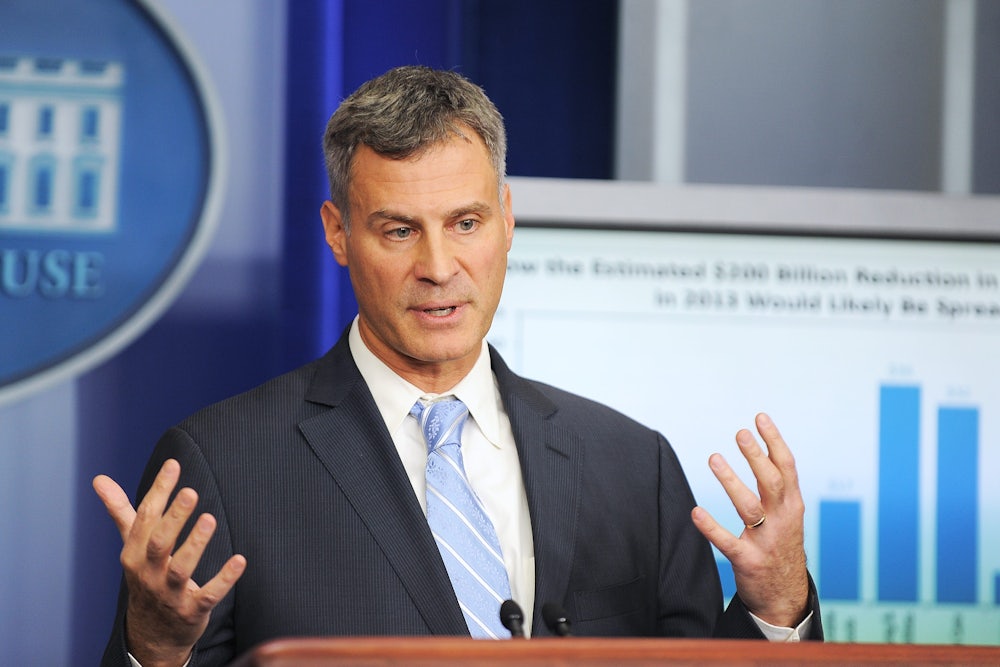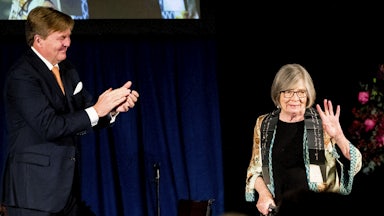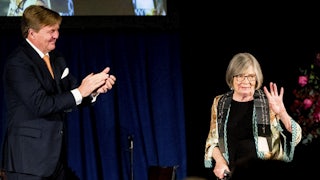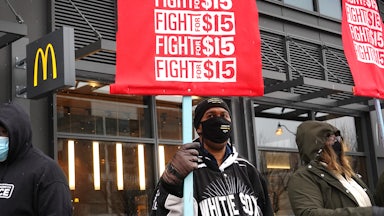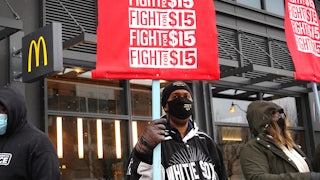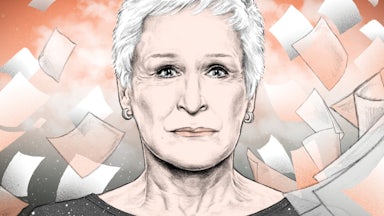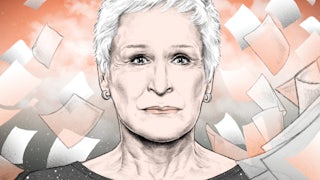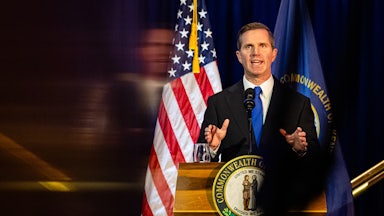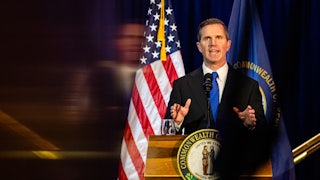Here’s a sad Zen riddle. If your work wins the Nobel and you’re no longer alive when the prize is awarded, are you a laureate? The Royal Swedish Academy of Sciences doesn’t award Nobel Prizes posthumously, so the economics prize given this year to Berkeley’s David Card, MIT’s Joshua D. Angrist, and Stanford’s Guido W. Imbens was not given also to the co-author of Card’s most important paper, on the minimum wage. That would be Princeton’s Alan Krueger, who took his own life in March 2019 at the age of 58.
A Nobel announcement is not typically an occasion for grief, but this week it was. “It’s truly tragic that Alan Krueger isn’t able to share in it, as he surely would have,” tweeted New York Times columnist Paul Krugman, who won the prize in 2008. “Thinking of Alan Krueger and his family today,” tweeted Washington Post columnist Catherine Rampell, who was Krueger’s undergraduate research assistant. Harvard economist Dani Rodrik tweeted, “Can’t help but think of Alan Krueger”; Harvard Law School’s Cass Sunstein tweeted “applause, and a few tears, for Alan Krueger”; and Zachary D. Carter, a biographer of John Maynard Keynes who four months ago interred the reputation of Milton Friedman in The New Republic, tweeted, simply, “Pour one out for Alan Krueger today, friends.”
“It was totally joint work,” Card told me by phone Tuesday night. “We conceived it together, we wrote it together, we did the analysis together.” Card said it was “unambiguously clear” that if Krueger were still alive, “he and I would have shared half the prize.” And maybe more than half: Card noted that Krueger co-authored with his co-winner Angrist an early paper on the economic effects of compulsory schooling that led to Angrist and Imbens’s later work on the same topic cited by the Nobel committee.
Card and Krueger got to know each other in the 1980s working side by side in the Industrial Relations Section of Princeton’s economics department, a think tank situated in Princeton’s Firestone Library that was endowed by John D. Rockefeller Jr. as a sort of penance for his role in the 1914 Ludlow Massacre. Card and Krueger were both “very empirical,” Card recalled, by which he meant they were more interested in gathering new information than in reconceptualizing existing data. They ended up co-authoring seven or eight papers together and a 1995 book, Myth and Measurement.
The book expanded on a 1994 paper that Card and Krueger co-authored on the minimum wage that changed completely the terms under which the minimum was discussed, first among economists and later among journalists and policymakers. The old orthodoxy, derived from a 1946 paper by George Stigler, a University of Chicago libertarian and Nobel laureate, and renewed in a 1982 paper led by University of Maryland economist Charles Brown, was that any minimum wage increase would increase unemployment. “There’s a virtual consensus among economists,” The New York Times editorial board stated in 1987, “that the minimum wage is an idea whose time has passed.” The editorial was headlined, “The Right Minimum Wage: $0.00.”
This judgment was grounded in seemingly unassailable logic. If you raise the cost of something, then people will buy less of it. If the thing whose cost you raise is a new hire, then businesses will buy fewer new hires. Duh!
But like a lot of economic theory, this construct failed to consider a variety of countervailing real-world factors, such as the increased productivity that might result from lower turnover and a more highly motivated workforce. In 1992, New Jersey ignored the advice of The New York Times editorial board and raised its hourly minimum wage above the federal minimum of $4.25 to $5.05. (“Why doesn’t the state of New Jersey win the Nobel for doing that?” my wife asked me yesterday. A fair point. A moment of tribute, please, for the still-living former New Jersey Governors Thomas Kean, Republican, and James Florio, Democrat.)
Card and Krueger decided to compare unemployment levels at fast-food restaurants in New Jersey to those in bordering eastern Pennsylvania, where the wage minimum remained $4.25. They found that after New Jersey raised its wage, full-time employment actually increased a bit in the Garden State relative to eastern Pennsylvania. Evidence was mixed on whether the minimum wage hike led to a price increase; although fast-food prices did increase in New Jersey relative to eastern Pennsylvania, there was no evidence within New Jersey that price hikes in those fast-food restaurants most affected by the minimum wage increase were greater than in those least affected by it.
This study changed economic policymaking. As Krueger noted in a 2015 “History of Economic Thought on the Minimum Wage,” Stigler’s and Brown’s research had been used by President Ronald Reagan to justify not raising the hourly minimum wage during his two terms in office. Reagan kept the federal minimum at $3.35, a miserly sum (though one that, even at the end of Reagan’s presidency, exceeded in real terms today’s more miserly $7.25). After President George H.W. Bush bumped the minimum up to $4.25, even Democrat Bill Clinton was reluctant to increase it further, preferring instead to increase the Earned Income Tax Credit.
But Clinton was persuaded finally in 1996 to raise it in stages to $5.15, in part by Card and Krueger’s paper. Krueger himself was by then working in Clinton’s administration as chief economist at the Labor Department. (Krueger would later be assistant treasury secretary for economic policy and chairman of the Council of Economic Advisers under President Barack Obama.) “Now, I’ve studied the arguments and the evidence for and against a minimum wage increase,” Clinton said in his 1995 State of the Union address. “I believe the weight of the evidence is that a modest increase does not cost jobs, and may even lure people back into the job market.” He was talking about Card and Krueger’s landmark paper.
This paradigm shift didn’t sit well with the old guard. Nobel laureate James M. Buchanan had the following comment for The Wall Street Journal:
The inverse relationship between quantity demanded and price is the core proposition in economic science, which embodies the presupposition that human choice behavior is sufficiently rational to allow predictions to be made. Just as no physicist would claim that “water runs uphill,” no self-respecting economist would claim that increases in the minimum wage increase employment … we have not yet become a bevy of camp-following whores.
It’s a matter of minor dispute whether Buchanan (of whom this magazine’s Michael Kinsley once wrote in The Wall Street Journal, “I had no idea it was so easy to win a Nobel Prize”) meant to say that Card and Krueger were “camp-following whores.” But the weight of evidence would suggest he did. Buchanan died in 2013. That same year, a survey of prominent economists by the University of Chicago, previously a mecca to libertarians like Buchanan, found that an overwhelming majority favored raising the minimum wage. Duh!
The political battle is not yet won. After Clinton increased the minimum wage, another decade would pass before it would rise to its present level under legislation signed into law by President George W. Bush. President Barack Obama ignored the issue during his first term, then pressed for ever-larger increases in his second, though to no avail. As a candidate, Donald Trump spouted a variety of conflicting positions on the minimum wage, progressing from saying it was already too high to saying it should rise to $10. But as president he never raised a finger to make that happen, partly because his top economic adviser, Larry Kudlow, adhering to the old orthodoxy, thought the minimum wage shouldn’t exist. The Biden administration’s most recent attempt to raise the minimum wage (to $15) got shot down by (guess who!) Senators Joe Manchin and Kyrsten Sinema, along with five other Democrats and Maine’s independent Angus King, although in this instance the issue was muddied by the Senate parliamentarian’s opposition to attaching it to the coronavirus relief bill. Congressional Republicans continue to block an increase, even though a March poll by Politico and Morning Consult indicated that 51 percent of Republican voters favored raising it to $11 or $15.
The deadlock at the federal level prompted Fight for $15, an advocacy group funded by the Service Employees International Union, to leverage Card and Krueger’s research to press for increases at the state and local level. This campaign has been a great success. Since January 2014,30 states and the District of Columbia have raised their wage minimums above the federal level, and 45 localities have raised them above the state level. Perhaps more important, 18 states have indexed the minimum wage so that it will rise automatically with inflation, as Biden proposes be done at the federal level. These increases represent what is arguably organized labor’s most significant achievement during the past decade.
This week’s Nobel Prize to Card and, by implication, Krueger, effectively repudiates views on the minimum wage voiced by laureates Stigler and Buchanan. They were wrong, and Card and Krueger were right. Some private grief unknown to us prompted Krueger to kill himself before he achieved this final triumph. But Krueger didn’t die unaware that he’d changed people’s minds about wages; his 2015 capsule history of the debate is a victory lap. Krueger may even have had some inkling that the Royal Swedish Academy of Sciences would take note. Still, he never got to savor it. “He probably would have enjoyed getting the Nobel Prize more than me,” Card told me sorrowfully. Requiescat in pace.
